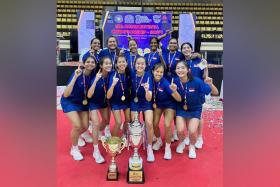Malaysian divers already have Olympics in their sights
Malaysia's divers already looking to make an impact at the Olympics
There was a hush that settled over the OCBC Aquatic Centre as Ooi Tze Liang entered the water with his fourth dive yesterday.
Malaysia's 2014 Commonwealth Games gold medallist in the 3m springboard was near flawless in his first three plunges, but fluffed his lines with the fourth as his feet slapped against the water's surface.
Judges awarded him scores of between 4.0 and 5.5, but such was the Malaysian's dominance that he still cruised to the SEA Games 10m platform gold medal.
Ooi won with a score of 415.50, with compatriot Chew Yiwei (393.65) second and Singapore's Jonathan Chan a distant third with 356.55.
Malaysia's regional hegemony was restated by their women's 3m synchronised springboard duo of Ng Yan Yee and Nur Dhabitah Sabri (292.62 points), who struck gold ahead of Singaporean pair Fong Kay Yian and Ashlee Tan (242.94) and Vietnam's Hoang Le Thanh Thuy and Ngo Phuong Mai (227.94).
As always, they are expected to dominate at the SEA Games, but Malaysia's divers are all working towards a spot at the top table - the Olympics.
Ng is already an Olympian, having competed in 2012 in London, and has proudly inked the famous five rings on her right ankle.
Ooi wants to make his debut next year in Rio de Janeiro, Brazil.
"Of course, Olympics is the ultimate dream - and not just being there, getting onto the podium," he said.
"My first target is Rio and, for that, I have to do well at the World Championships (next month)."
Individual divers have to finish in the top 12 at the championships to qualify for Rio, while the synchro pairs need a top-three finish to earn their ticket.

Ooi is training full-time and credits the Malaysian diving programme for his rise.
"Diving is my work and we train eight hours a day, six days a week. Training is tough but, if I study and train, I won't be able to manage it," he said.
Ng started diving at 12, an age that she says is "late", especially in comparison to her partner Dhabitah, who got going aged just seven, because her father thought she was to small to be a competitive swimmer.
The picture is distinctly different in Singapore.
"Most of us only started at the (2010 Singapore) Youth Olympic Games, and eventually I think we can catch up with Malaysia, but it'll take time," said Chan.
While his Malaysian counterparts are already dreaming of glory on the world stage, Chan may not even stay in the sport - a constant struggle for several National Sports Associations here.
"It depends on what happens, I'll have to see how things go," said the 18-year-old International Baccalaureate student.
The constant struggle to juggle school commitments - later work - and sports is a perennial problem for athletes here.
"Most of the Malaysian divers are professional divers, they don't have school. We can't train as hard as them," said Fong.
"In fact, we probably train half as much as they do, and can't afford the time to go to China to train like some of the Malaysian divers."
It is a sport that requires a high level of technical expertise, ask Myanmar's Htet Zaw Myo.
He appeared to land flat on his back in his fourth dive in the men's 10m platform yesterday, an impact that Ooi likened to "being hit by a car going at 60kmh", but organisers revealed that Htet was taken to hospital only as a precaution.
Mastery is what the Malaysians are aiming for, but they are taking nothing for granted here.
Even if they are working to succeed at the 2016 Rio Olympics.
Get The New Paper on your phone with the free TNP app. Download from the Apple App Store or Google Play Store now




